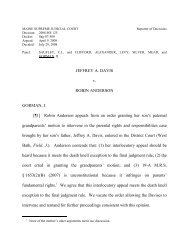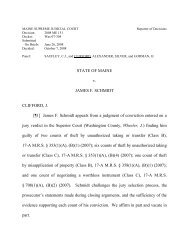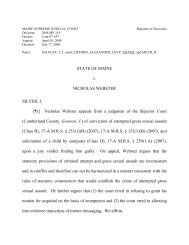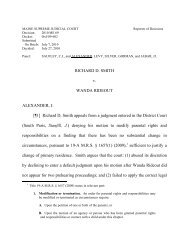NAHABET CIMENIAN v. CAROLLE LUMB CLIFFORD, J. [¶1 ...
NAHABET CIMENIAN v. CAROLLE LUMB CLIFFORD, J. [¶1 ...
NAHABET CIMENIAN v. CAROLLE LUMB CLIFFORD, J. [¶1 ...
Create successful ePaper yourself
Turn your PDF publications into a flip-book with our unique Google optimized e-Paper software.
MAINE SUPREME JUDICIAL COURT Reporter of Decisions<br />
Decision: 2008 ME 107<br />
Docket: Yor-07-317<br />
Submitted<br />
On Briefs: February 28, 2008<br />
Decided: June 26, 2008<br />
Panel: <strong>CLIFFORD</strong>, ALEXANDER, LEVY, SILVER, MEAD, and GORMAN, JJ.<br />
<strong>CLIFFORD</strong>, J.<br />
<strong>NAHABET</strong> <strong>CIMENIAN</strong><br />
v.<br />
<strong>CAROLLE</strong> <strong>LUMB</strong><br />
[1] Nahabet Cimenian appeals from the order of the Superior Court (York<br />
County, Fritzsche, J.) awarding attorney fees to Carolle Lumb following the entry<br />
of judgment in favor of Lumb on Cimenian’s complaint against her. Although<br />
Cimenian did not appeal from the underlying judgment in favor of Lumb, he<br />
contends that the post-judgment order awarding attorney fees is unwarranted, and<br />
constitutes an abuse of the court’s discretion. We disagree and affirm the order.<br />
I. BACKGROUND<br />
[2] From the trial transcript and the court’s judgment on the merits, which<br />
was not appealed, the following facts are taken. This case started with what the<br />
trial court described as a “very murky, very questionable transaction.” In 1997,<br />
Nahabet Cimenian, William Lumb, who is Carolle Lumb’s husband, and Allen
2<br />
Fernald entered into a partnership formed to purchase two bankruptcy claims in the<br />
bankruptcy estate of Cimenian’s mother-in-law, Catherine Petit. The claims<br />
included interest in real property located at One Fourth Street, Old Orchard Beach<br />
(the beach house). According to Cimenian, he paid approximately $70,000 for a<br />
one-quarter share in the property, Fernald paid approximately $140,000 for a<br />
one-half share, and William received a one-quarter share for which he paid<br />
nothing. The partnership decided that title to the beach house would be held in<br />
William’s name alone. The court found the purpose of the partnership to be<br />
unclear: “there was this one quarter, one quarter, one half partnership, but the<br />
details are very indefinite and there’s nothing specifically about mortgaging or not<br />
mortgaging.” The court further stated:<br />
Other than the one quarter, one quarter, one half shares, there is<br />
nothing explicit as to when [the beach property] would be sold, who<br />
would buy anybody out, who would pay the expenses, though I guess<br />
it’s assumed they would share in that ratio, but that’s not stated, and<br />
there is no prohibition in this partnership arrangement that explicitly<br />
says that Mr. Lumb can’t mortgage it.<br />
[3] Subsequently, Catherine Petit was indicted for bankruptcy fraud. On<br />
June 19, 1998, William took out a mortgage on the beach house. The money from<br />
the mortgage, at least in part, was put in an account called the Legal Defense Fund,<br />
and was used to pay for Catherine Petit’s legal representation and other related<br />
costs. Although Cimenian denied any knowledge of the Legal Defense Fund, there
was evidence that he had contributed money to the fund. The court specifically<br />
found that Cimenian’s testimony denying any knowledge of the Legal Defense<br />
Fund was untruthful.<br />
[4] In October 1999, William sold the beach house to James and Patricia<br />
Brown. None of the profits from the sale were given to Cimenian.<br />
[5] Subsequent to the sale of the beach house, William filed for<br />
bankruptcy. Cimenian had the opportunity to bring a claim against William<br />
regarding the sale of the beach house and hired an attorney for that very purpose.<br />
Cimenian’s attorney withdrew as his counsel because Cimenian made several<br />
unethical requests of him. Cimenian did not obtain subsequent counsel, and he<br />
filed no claim against William’s bankruptcy estate.<br />
[6] Foreclosed from filing suit against William Lumb because William had<br />
been discharged in the Bankruptcy Court, Cimenian filed a nine-count complaint<br />
against Carolle Lumb, based on the transactions involving the beach house.<br />
Cimenian sought a declaratory judgment, an accounting, and the creation of a<br />
constructive trust, and alleged unjust enrichment, constructive fraud, fraud,<br />
conspiracy to commit fraud, conversion, and conspiracy to commit conversion.<br />
The court entered summary judgment in favor of Lumb on the counts seeking<br />
declaratory judgment and an accounting. A nonjury trial was conducted on the<br />
remaining counts.<br />
3
4<br />
[7] The trial revealed that Lumb was a cosigner on the mortgage for the<br />
beach house, but never held title in the property. She had no role in William’s<br />
acquisition of the property, nor in its subsequent sale. She did not sign the deed<br />
from William conveying the property to the subsequent owners. Following the<br />
trial, the court entered judgment for Lumb on all remaining counts of the<br />
complaint, finding Cimenian’s suit to be without merit. The court found that, “Ms.<br />
Lumb may have made some mistakes in retrospect of not asking some questions<br />
about what in the world is going on here or what’s this all about. That however is<br />
not grounds to sue her.” The court found that “none of [the] remaining counts<br />
have even the slightest [] merit after examining all of the evidence.” (Emphasis<br />
added.) Cimenian did not appeal the court’s judgment, nor did he request<br />
additional findings of fact.<br />
[8] Lumb subsequently filed a motion for attorney fees. 1 The court granted<br />
the motion and awarded attorney fees in the amount of $50,146.25, finding that the<br />
claims brought by Cimenian were “baseless, frivolous and without merit.” Further,<br />
the court found that “[t]here [were] not good grounds to support the plaintiff’s case<br />
and it was [intended] to harass the defendant.” “This case is one of the few cases,”<br />
the court stated, “where ‘most extraordinary circumstances’ exist and attorney’s<br />
1 The motion for attorney fees was supported by an affidavit and an eighteen page itemized list of<br />
charges with the following breakdown: 221.90 hours at a rate of $175 per hour for Attorney Goodman’s<br />
service, 17 hours at $135 per hour for an associate attorney, 68.97 hours at $125 per hour for an associate<br />
attorney, and 5.30 hours at $75 per hour for an associate attorney, providing for a total of $50,146.25.
fees should be awarded.” Cimenian filed this appeal challenging the award of<br />
attorney fees.<br />
II. DISCUSSION<br />
[9] We review an award of attorney fees for an abuse of discretion. See<br />
Chiappetta v. LeBlond, 544 A.2d 759, 760 (Me. 1988). Cimenian contends that the<br />
court abused its discretion in awarding attorney fees to Lumb because Cimenian<br />
did not abuse the litigation process, and his claims were not frivolous,<br />
unreasonable or without foundation. Cimenian further argues that the court did not<br />
make specific findings as to what conduct constituted the “extraordinary<br />
circumstances” warranting the award of attorney fees.<br />
[10] Cimenian, however, did not appeal the court’s judgment in favor of<br />
Lumb, nor does he challenge the factual findings underpinning that judgment.<br />
Moreover, Cimenian does not claim that the amount of the attorney fees incurred<br />
by Lumb, $50,146.25, is unreasonable on its face. The only issue before us is<br />
whether the lawsuit prosecuted by Cimenian is sufficiently groundless to justify the<br />
award of attorney fees.<br />
[11] The court found that the award of attorney fees was justified because<br />
the claims were “baseless, frivolous and without merit,” “intended to harass” the<br />
defendant, and that “most extraordinary circumstances” existed. “The court’s<br />
authority to award attorney fees may be determined by statute, by the ‘American<br />
5
6<br />
Rule’ at common law that generally prohibits taxing the losing party in litigation<br />
with a successful opponent’s attorney fees, or by certain recognized common law<br />
authorizations of attorney fees.” Linscott v. Foy, 1998 ME 206, 16, 716 A.2d<br />
1017, 1021 (quotation marks omitted). A trial court possesses “inherent authority<br />
to sanction parties and attorneys for abuse of the litigation process.” Chiappetta,<br />
544 A.2d at 760. Such authority should be used sparingly, however, and sanctions<br />
should be “imposed only when the abuse of the process by parties or counsel is<br />
clear.” Id. at 761. This inherent authority to award attorney fees, as an exception<br />
to the well-established American Rule that parties are responsible for the payment<br />
of their own attorney fees, should be exercised only “in the most extraordinary<br />
circumstances.” Linscott, 1998 ME 206, 17, 716 A.2d at 1021. “[A]ttorney fees<br />
may not be awarded as a sanction in the absence of significant bad faith on the part<br />
of a litigant or his agents.” Id.<br />
[12] We have upheld an award of attorney fees when a litigant repeatedly<br />
refused to comply with a final court order and filed multiple suits in several<br />
jurisdictions, suits which were merely collateral attacks on a prior court order. Id.<br />
18, 716 A.2d at 1021-22. We had “no difficulty concluding that [those] actions<br />
were undertaken in bad faith and were abusive of the court and the other parties.”<br />
Id. 18, 716 A.2d at 1022.
[13] Here, Cimenian was not able to bring claims against William Lumb<br />
because William’s debts had been discharged in bankruptcy. His alleged claims<br />
against William arose out of William’s ownership and sale of the beach house.<br />
Cimenian brought these claims against Carolle Lumb even though she never held<br />
title to or any ownership interest in that property. Moreover, the court found that<br />
Cimenian testified in court untruthfully about not knowing about Catherine Petit’s<br />
Legal Defense Fund, and about the reason why his attorney withdrew from<br />
representing him during William’s bankruptcy proceedings. In addition to<br />
bringing an action without “even the slightest merit,” testifying untruthfully about<br />
matters relevant to the issues being litigated is bad faith and can constitute<br />
extraordinary circumstances. Accordingly, the court did not act beyond its<br />
discretion in awarding attorney fees as a sanction, and the court’s findings,<br />
delivered from the bench, were sufficient to support the award of attorney fees.<br />
The entry is:<br />
Judgment affirmed.<br />
Attorney for Nahabet Cimenian:<br />
Chris A. Nielsen, Esq.<br />
Nielsen & Bly, P.C.<br />
PO Box 1871<br />
Biddeford, Maine 04005-1871<br />
7
8<br />
Attorney for Carolle Lumb:<br />
Joseph L. Goodman, Esq.<br />
Goodman Law Firm, P.A.<br />
392 Fore Street<br />
PO Box 7523<br />
Portland, Maine 04112


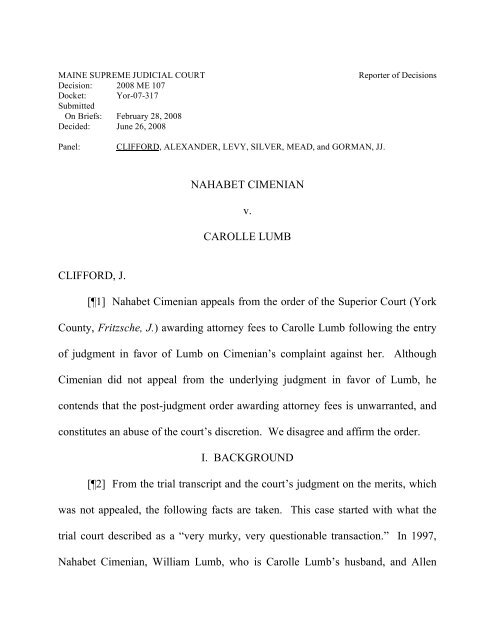
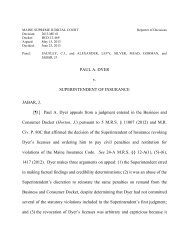

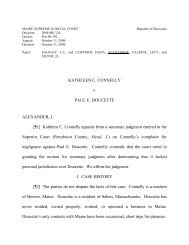
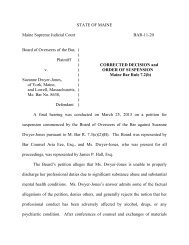
![GAIL THOMPSON v. PAUL R. ROTHMAN CALKINS, J. [¶1] Gail ...](https://img.yumpu.com/22013724/1/190x245/gail-thompson-v-paul-r-rothman-calkins-j-1-gail-.jpg?quality=85)
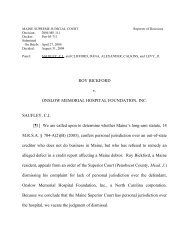
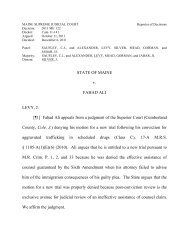
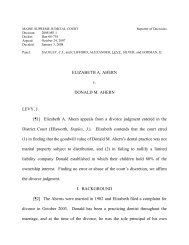
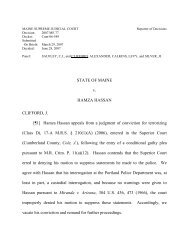
![PAUL CREAMER v. EDWARD BISHOP et al. PER CURIAM [¶1] Paul ...](https://img.yumpu.com/12279115/1/190x245/paul-creamer-v-edward-bishop-et-al-per-curiam-1-paul-.jpg?quality=85)
